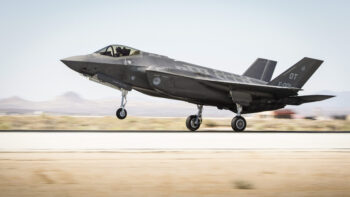
BREAKING [updated 4:15 pm with new contractor responses]: The Air Force will terminate its contract to buy a new Light Air Support plane for the fledgling Afghan air force, and it will launch an investigation into the original decision to select the Brazilian-designed Super Tucano aircraft being provided by Sierra Nevada Corporation. Rival contractor Hawker Beechcraft filed suit in January after the Air Force excluded its AT-6 aircraft from the competition, getting a stop-work order imposed on the program. Since then, the two companies have been involved in a bitter press and lobbying battle, complete with bizarre rumors involving George Soros, over the merits of their aircraft and the number of jobs each would create in the U.S. But the termination announcement is an ominous new development in the troubled program and a new setback for an Air Force procurement system that has repeatedly run aground on contract disputes in recent years.
“I’m surprised,” said industry analyst Richard Aboulafia. “Normally if there’s a problem, GAO discovers it before it gets to this level….It looked as though the Air Force procurement system had gotten its act together after the horrors of KC-X and CSAR-X.”
“It is the Air Force’s intention to terminate the contract,” Air Force spokesperson Jennifer Cassidy told Breaking Defense. Cassidy provided a written statement reading:
Today, the Air Force advised the Department of Justice that it will take corrective action on the Afghanistan Light Air Support contract and will set aside the contract award to Sierra Nevada effective March 2, 2012. Michael B. Donley, the Secretary of the Air Force, said, “While we pursue perfection, we sometimes fall short, and when we do we will take corrective action. Since the acquisition is still in litigation, I can only say that the Air Force Senior Acquisition Executive, David Van Buren, is not satisfied with the quality of the documentation supporting the award decision.” Additionally, General Donald Hoffman, commander of Air Force Materiel Command, has initiated a Commander Directed Investigation into the matter.
“I found out this morning,” said a weary Taco Gilbert, a retired Air Force general and current Sierra Nevada vice-president, in an interview with Breaking Defense. “We had no intimations this was coming…. Certainly after having gone through the award process, the appeal to the GAO, and well into the preparation for the litigation, we had not expected this turn.”
Where next? “We would expect to receive direction in the next few days where the Air Force will go with the program,” Gilbert said, “and we remain committed to the program because we believe we have the right solution for the warfighter… We’re disappointed, but quite frankly we’re determined to go forward. We remain confident in the aircraft and very confident in the team that we pulled together.”
Rival Hawker Beechcraft issued a statement from company chairman Bill Boisture, also a former Air Force pilot, praising the decision to “reinstate Hawker Beechcraft Defense Company to the competitive range under the procurement.” The company’s website touting their AT-6 aircraft linked to a statement from Kansas Congressman Mike Pompeo, whose district is Hawker Beechcraft’s home and who sounded outright exultant: “I applaud the United States Air Force for finally starting to remove the veil of secrecy with regard to the LAS contract,” Pompeo’s statement said. “I’ve said consistently that something about this didn’t smell right, and I’m glad I followed my instincts to fight for Hawker Beechcraft and for the jobs it provides for Kansans.”
The fight isn’t over yet, however. The Air Force has yet to determine whether it will hold a new competition for the contract — or perhaps scrap it altogether. Aboulafia’s bet on what happens next? The latest anti-American riots in Afghanistan and attacks on U.S. advisors in Afghan government ministries “strongly suggest that this doesn’t happen,” he said. “In these circumstances, continuing to buy Air Force aircraft for an ally that looks unlikely to remain an ally for more than a six month time horizon just doesn’t seem like a workable proposition.”
Connecticut lawmakers to grill Army, Lockheed about job cuts at Sikorsky helicopter unit
“The Connecticut delegation has questions about why, with that [FY24] appropriation in hand, this happened,” said Rep. Joe Courtney, D-Conn.


























